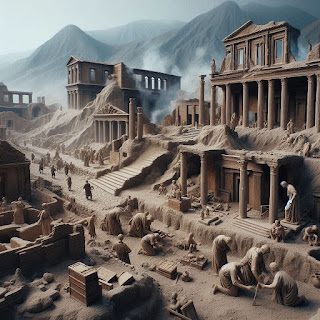I visited Pompeii, many years ago. The sun was merciless on that day (though it was not summer, but autumn) , making it difficult for me to concentrate on the archeological findings. I managed ,however, to spend about three hours there.
The ancient Roman city of Pompeii was destroyed by the 2-day Vesuvius volcano eruption in 79 AD. The city got burried in volcanic ash just like its neighbor Herculaneum and other villages in the area.
Pompeii was excavated in the 19th and 20th century in a fabulous state of preservation giving great insight into Roman everyday life.
I've recently read in an article, that the activity of Vesuvius ,volcano overlooking the entire Bay of Naples, was not the only cause of destruction. There was an earthquake going on at that time; perhaps stirred by the volcanic eruption.
It's amazing, how after so many years, scientists find new evidence, and reach new conclusions. They say, this is due to disciplinary interaction that wasn't available before: geologists, forensic doctors, historians, architects - use an approach that connecta and integrates several methods and specialties in the pursuit of a common target.




.JPG)
